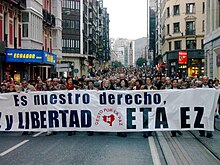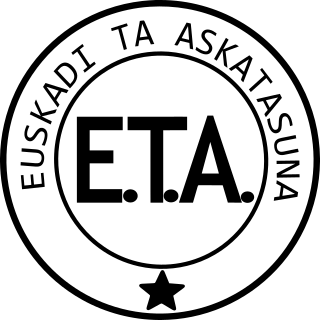
ETA, an acronym for Euskadi Ta Askatasuna, was an armed Basque nationalist and far-left separatist organization in the Basque Country between 1959 and 2018, with its goal being independence for the region. The group was founded in 1959 during the era of Francoist Spain, and later evolved from a pacifist group promoting traditional Basque culture to a violent paramilitary group. It engaged in a campaign of bombings, assassinations, and kidnappings throughout Spain and especially the Southern Basque Country against the regime, which was highly centralised and hostile to the expression of non-Castilian minority identities. ETA was the main group within the Basque National Liberation Movement and was the most important Basque participant in the Basque conflict.
Batasuna was a Basque nationalist political party. Based mainly in Spain, it was banned in 2003, after a court ruling declared proven that the party was financing ETA with public money.

Basque nationalism is a form of nationalism that asserts that Basques, an ethnic group indigenous to the western Pyrenees, are a nation and promotes the political unity of the Basques, today scattered between Spain and France. Since its inception in the late 19th century, Basque nationalism has included Basque independence movements.

The Basque Nationalist Party, officially Basque National Party in English, is a Basque nationalist and regionalist political party. The party is located in the centre of the political spectrum.
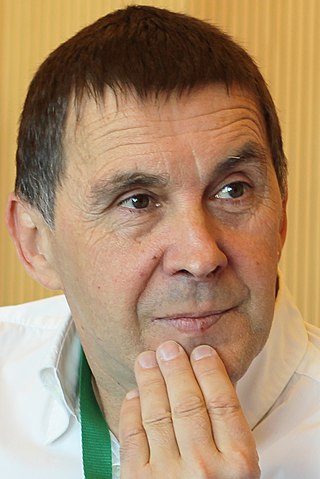
Arnaldo Otegi Mondragón is a politician from the Basque Country who has been the General Secretary of Basque nationalist party EH Bildu since 2017. He was member of the Basque Parliament for both Herri Batasuna and Euskal Herritarrok. He was a convicted member of the ETA, a banned armed separatist group organization, in his early years. He was one of the key negotiators during the unsuccessful peace talks in Loiola and Geneva, in 2006.

Ermua is a town and municipality located in the province of Biscay, in the autonomous community of Basque Country, northern Spain. In 2019, Ermua had 15,880 inhabitants.
¡Basta Ya! was a Spanish grassroots organization uniting individuals of various political positions against terrorism and violence, notably ETA, and against the proposal for a new Statute of Autonomy of the Basque Country released by the government of President Juan José Ibarretxe. Its principal activities were anti-terror demonstrations and protests. The ¡Basta Ya! movement was a civic initiative made up of people of differing ideologies, and welcomes any citizens willing to play an active part provided they adhere to three basic principles: defend against terrorism of any sort, regardless of origin or intensity, support all victims of terrorism or of political violence and defend the rule of law, the Spanish Constitution and the Statute of Autonomy of the Basque Country. ¡Basta Ya! was created to promote social mobilization against the perpetrators of specific kinds of violence, to support those who are suffering from them, and to demand that authorities fulfill the requirements of current legislation, respecting the rule of law. The organization believes that criticism of terrorism on moral grounds is important but not enough. Criticism on political grounds is also important, and the initiative understands such criticism to be based on certain values – such as human rights - which are common to all democrats regardless of their party affiliations or their political leanings.
The Foro Ermua was a Spanish civic association, the membership of which was composed of Spanish citizens. It was founded on 13 January 1998; its last president was Mikel Buesa.
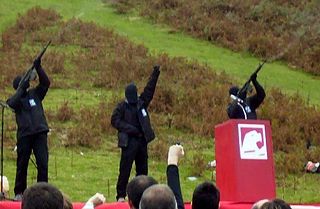
The Basque conflict, also known as the Spain–ETA conflict, was an armed and political conflict from 1959 to 2011 between Spain and the Basque National Liberation Movement, a group of social and political Basque organizations which sought independence from Spain and France. The movement was built around the separatist organization ETA, which had launched a campaign of attacks against Spanish administrations since 1959. ETA had been proscribed as a terrorist organization by the Spanish, British, French and American authorities at different moments. The conflict took place mostly on Spanish soil, although to a smaller degree it was also present in France, which was primarily used as a safe haven by ETA members. It was the longest running violent conflict in modern Western Europe. It has been sometimes referred to as "Europe's longest war".

Sortu is a Basque socialist political party. Founded in February 2011, it is the first political party belonging to the Basque nationalist "abertzale left" that openly rejects any kind of political violence. Before Sortu, sections of the Basque nationalist left who rejected ETA's violence left the movement and founded another party, Aralar, to represent that element of the abertzale left.
The 1980 Zarautz attack was a mass shooting gun attack by the Basque separatist organisation ETA which occurred on 3 November 1980 in the Basque town of Zarautz in Gipuzkoa. The targets were several off duty civil guards belonging to the traffic department, who were drinking in a bar in the town. The attack was the second deadliest of 1980, the year when ETA killed more people than any other.
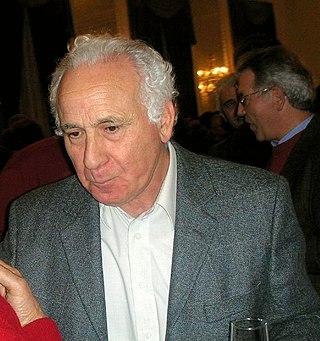
Joxe Azurmendi Otaegi is a Basque writer, philosopher, essayist, and poet. He has published numerous articles and books on ethics, politics, the philosophy of language, technique, Basque literature and philosophy in general.
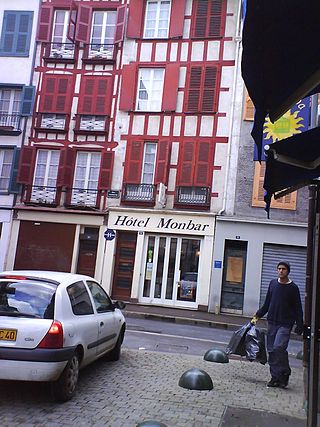
The Monbar Hotel attack was carried out by the Grupos Antiterroristas de Liberación (GAL), a Spanish state-sponsored death squad, on 25 September 1985 in Bayonne, Pyrénées-Atlantiques, France. The targets were four members of the Basque separatist terrorist group Euskadi Ta Askatasuna (ETA), whom the Spanish government believed to be senior figures in the organization, itself proscribed as a terrorist group in Spain and France. All four people were killed, with a fifth person, apparently unconnected to ETA, injured in the shooting. This represented the deadliest attack carried out by the GAL. Although two of the participants were apprehended shortly after the shooting, controversy surrounded the possible involvement of senior figures in the Spanish police.
Many people have been imprisoned, placed on remand, or otherwise kept in custody due to their illegal activity in support of the Basque National Liberation Movement.

The Galician independence movement or the Galician separatist movement is a political movement derived from Galician nationalism that supports the independence of Galicia and the other Galician-speaking territories outside the Autonomous Community of Galicia, including As Portelas, O Bierzo, and the Eo-Navian lands from Spain.

María Teresa "Maite" Pagazaurtundúa Ruiz, also known as Maite Pagaza, is a Spanish politician, activist and writer. For ten years, she has been an MEP in the European Parliament, where she has been a member of the political groups Renew Europe and ALDE.

Women in ETA in Francoist Spain were few in numbers. Euskadi Ta Askatasuna (ETA) grew out of a Basque nationalist movement with roots that pre-dated the Second Spanish Republic. When Franco seized power, the new regime cracked down on Basque nationalism, imprisoned and killed many activists and made traditional women's activism difficult to continue. Basque nationalists began to stockpile weaponry following the end of World War II. ETA was created in 1952 by students in Bilbao, creating a fissure in the Basque nationalist community by the mid-1950s. Their attitude towards women was patriarchal and informed by their conservative Roman Catholicism. There would be few women in the movement in this period.

Women in the Basque Nationalist Party in Francoist Spain were involved in leadership positions from an early period. The Basque Nationalist Party (PNV) was founded prior to the Second Spanish Republic in Bilbao, as a conservative Roman Catholic organization. They initially tried to be neutral during the Civil War, but later more openly opposed Nationalist forces. This led to repression and investigation after the war of women PNV members, and wives and daughters of male PNV members. Emakume Abertzale Batza, PNV's women political section, was operated in exile in this early period.

The Burgos trials were a series of military tribunals held in the Spanish city of Burgos from 3 to 9 December 1970. The trials prosecuted 16 members of the Basque separatist organisation Euskadi Ta Askatasuna (ETA) for their involvement in two murders of police officers in 1968. Causing international outrage and sympathy for the defendants, the trials are best known for the six death sentences handed out by the tribunals which were later commuted to lengthy prison sentences.
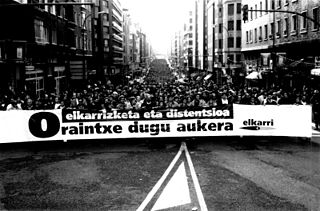
Elkarri was an organization that sought a peaceful resolution of the Basque conflict.
